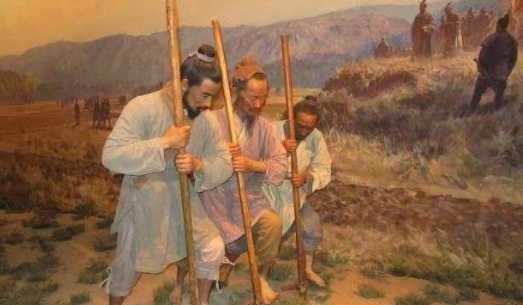Little is known about the situation of the slave class.
For example, what is the proportion of slaves and other populations in the whole country or in a certain region? How many slaves were directly enslaved by the Son of Heaven, the princes, or the Great Masters? We don't know.
The highest record is that the Duke of Jin Jing (599 BC to 581 BC) rewarded him with a thousand families of "Di Chen" (Di ren slaves) to a newly established doctor Xun Lin's father.
This was followed by a newly ordained doctor whom the Duke of Qi Ling (581-554 BC) gave him three hundred and fifty slaves. Father Xun Lin had already been the ruler of two dynasties before this gift, and the original slaves in his family should at least be able to withstand the reward this time.
It can be seen that when the slaves of a big country will be more than ten thousand.
The main source of these slaves was war.

Needless to say, the great battle between Ke Yin and the Eastern Crusade at the beginning of the Zhou Dynasty, after the conquest of foreign races and the mutual attacks of the princes, each time the captives captured inside and outside the battlefield, except for a very small number, were sometimes used to "pick the drum" (kill and take blood to paint the drum, in order to remove the ominous) or as sacrifice sacrifices, most of them were slaves of the victors.
After the fall of the Yin dynasty, there must have been a lot of Captives of the Yin people, but there are a few that cannot be confirmed now (unreliable as contained in the Book of Yi Zhou).
The number of captives after that can be known: for example, 13,810 people were captured in the battle of the ghost fang in the twenty-fifth year of king Cheng, and as mentioned above, the "Di Chen" family that was rewarded to Xun Lin's father was part of the newly captured captives at that time.
For example, in 484 BC, the State of Wu and the State of Lu fought Qi, capturing 800 cars and 3,000 soldiers. The interests of captives sometimes became the motivation for the invasion.
Princes often had ceremonies of consecration of prisoners to the Son of Heaven, or small states to large countries. Prisoners captured by the Kingdoms of Xia could be redeemed. The State of Lu stipulated that the cost of redemption of prisoners shall be borne by the national treasury. But those who are redeemed are probably only the captives of the nobles, and sometimes they are not paid for.
For example, in 607 BC, the Song Dynasty redeemed the Huayuan that was "blind to his eyes and his belly" to Zheng Ren, and used a hundred military vehicles and a hundred horses (but before he could pay half of these gifts, he escaped back).
Another source of slavery was criminals.
Although the fact that the criminal servants and their families were enslaved into your house are not recorded, we know that your family was deposed for sin or destroyed because of mutual strife, and that some of his wives and children were tied up or captured as rewards, and their descendants were "descended to the soap".